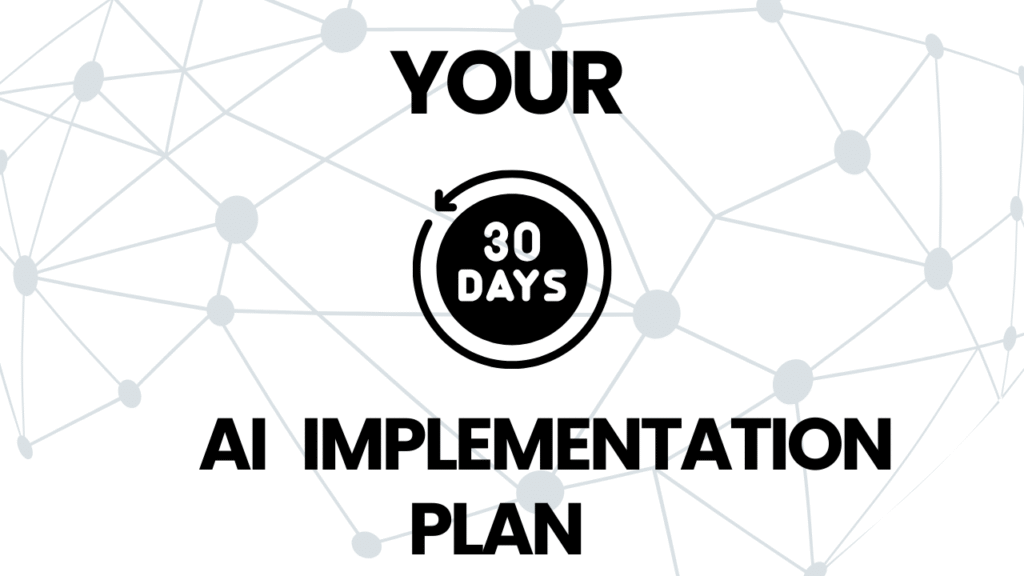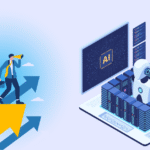The fact is, all small business owners are looking for a leg up on their competition. Small companies, on the other hand, do not have the budget and manpower that a behemoth bonanza enjoys. That is where AI (Artificial Intelligence) comes into play—no longer the domain of only tech giants. AI tools today are inexpensive, easy to use, and can restore the balance between minnow businesses and their larger counterparts.
If you own a small business and are reading this, wary of how A.I. can help your Scale, Marketing, or Customer Acquisition—This page is for you! In this guide, I will explain precisely how you can leverage AI to increase your sales, save time, and make your customers happier, all without spending an arm and a leg or obtaining a computer science degree.
Here’s Why Small Businesses Need AI Immediatly
Our business world is in a fast-paced conversion, and we all need to keep up with that change on the planet. Other businesses in your space may be using AI-based technology today to deliver superior customer service or create content at a higher speed, or perhaps make better decisions than you. Why the AI bandwagon is not just fashionable but essential:
The Numbers Don’t Lie
- Small business productivity is up 73% using AI
- Customer satisfaction is 25% higher for companies using AI for customer service
- Small businesses that use AI are 30% more likely to grow their market share faster than firms that do not have the tools, according to McKinsey
- Operational costs can be cut by as much as 40% with AI
This Will Level the Playing Field
Big companies have always had advantages—larger staff sizes, bigger budgets and more cutting-edge technology. But AI tools nowadays are so affordable that a business owner can access similar technology as the Fortune 500 companies. Now you can also compete on customer service, marketing reach and data analysis without building a huge team.
The Rise in Customer Expectations
Your customers want fast replies, tailored experiences, and 24/7 service. They’re not thinking “oh, you’re a small business; I don’t need that Amazon or Netflix service level from you.” But AI makes it possible for you to meet those expectations, without having to work 24/7.
The Game-Changer AI Tools for Customer Service
If you are running a small business, your ability to provide excellent customer service may determine whether or not your company survives its first year of trading. This is because happy customers are the ones that return and refer their friends. Unhappy customers write negative reviews or just go elsewhere in the future. With AI, you can have the best possible customer service even in your absence.
Chat Support That Never Sleeps
Although I know what you might be thinking: “I DO NOT want a robot answering my customers’ questions.” Modern AI chatbots are NOT the robots we remember from long ago. Today’s AI chatbots can:
- Answer common questions instantly
- Help customers find products
- Schedule appointments
- Collect customer information
- Escalate difficult matters to a human
Best chatbot platforms for small businesses:
- Intercom — Specifically for e-commerce based online stores
- Tidio — Perfect for service-based businesses
- ChatGPT plugins — As per your industry requirements
- Drift — Good for generating leads
Real World Success Story
Sarah’s small online jewelry shop reported a 45% rise in website conversions once an AI chatbot was incorporated. She sleeps while the bot deals with questions regarding ring sizes, shipping, and returns. Sarah provides instant support and wakes up to even more sales.
Smart Email Management
AI can handle email management by:
- Sorting emails by urgency
- Sending instant acknowledgments
- Passing technical questions to the right person
- Drafting response suggestions
- Tracking follow-up needs
AI tools like Mailchimp, HubSpot, etc., can achieve personalization at scale. They use customer actions as feedback and adjust on their own:
- Email subject lines to obtain higher open rates
- Product recommendations based on previous purchases
- Choosing the best times for clients to be more inclined to read
- Content that matches customer interests
Marketing Magic: AI-Powered Growth Strategies
For small businesses, AI really hits its stride in marketing. You can design campaigns that are professional and on point, reach the right customers at each stage of your sales funnel, and measure impact—no marketing degree necessary!
Content Creation Revolution
AI writing tools you can use for:
- SEO-optimized blog posts
- Product descriptions that sell
- Social media captions
- Email newsletters
- Press releases
Top 4 AI Writing Tools
| Tool | Best For | Monthly Cost | Key Features |
| Jasper | Long-form content | $49+ | SEO optimization, brand voice |
| Copy.ai | Marketing copy | $36+ | Templates, team collaboration |
| Writesonic | Blog posts | $19+ | AI article writer, fact-checking |
| Grammarly | Editing | $12+ | Grammar, tone, clarity |
Visual Content Creation
Creating pro-quality graphics used to need expensive software and design skills. Now AI tools can generate:
- Social media graphics
- Logo designs
- Product photos
- Marketing banners
- Video thumbnails
Recommended Visual AI Tools:
- Canva AI – Templates with smart suggestions
- DALL-E 2 – Custom image generation
- Midjourney – Artistic style images
- Remove.bg – Background removal
- Loom – AI-powered video creation
Social Media Automation
AI-powered social media tools can handle:
Content Scheduling and Optimization
- Post at the best times for engagement
- Schedule posts automatically
- Suggest hashtags that increase reach
- Create content calendars
- Analyze competitor strategies
- Come up with post ideas around what is currently trending
Match Your Product to the Right Audience
Where one method involves guessing who will buy your product, AI analyzes data to locate the people most likely to purchase from you. It looks at:
- Demographics (age, location, income)
- Interests and hobbies
- Online behavior patterns
- Purchase history
- Social media activity
Search Engine Success
SEO optimization has been time-consuming and difficult. AI SEO tools now:
- Research keywords well for your business
- Optimize your website content automatically
- Track your search rankings
- Suggest improvements
- Monitor competitor strategies
AI Local Business Advantage
Local SEO: AI helps brick-and-mortar stores with:
- Google My Business optimization
- Local keyword targeting
- Review management
- Location-based advertising
- Map listing improvements
Operations and Efficiency: Smart Work Before Hard Work
Small business owners wear a lot of hats. By delegating mundane jobs to AI, you can pay more attention to scaling your business and serving customers.
Smart Inventory Management
Based on your sales history and market influences, demand forecasting AI predicts:
- What will sell the most during the upcoming month
- How much inventory to order
- Seasonal demand changes
- Trending product categories
- Optimal reorder points
Cost Savings Benefits:
- Reduce overstock by 25-40%
- Prevent stockouts that lose sales
- Optimize storage space
- Improve cash flow
- Minimize waste on perishable items
Financial Management Made Simple
AI bookkeeping software can be automated to:
- Categorize expenses automatically
- Generate financial reports
- Track tax deductions
- Monitor cash flow
- Send payment reminders
- Detect unusual spending patterns
Popular AI Accounting Solutions:
- QuickBooks AI — Complete business accounting process
- Xero — Cloud solution with intelligent features
- FreshBooks — Ideal for service-oriented businesses
- Wave — Ideal for free or very small businesses
- Receipt Bank — Receipt tracking and sorting
Hiring and Team Management
Small businesses have a hard time with recruiting efforts. AI helps by:
- Screening resumes automatically
- Scheduling interviews
- Asking pre-qualifying questions
- Checking references
- Predicting candidate success
Boost Employee Performance with AI Productivity Tools
- Project management with smart scheduling
- Time tracking and productivity insights
- Training recommendations
- Performance analytics
- Workload balancing
Data-Driven Decision Making
Gut decisions are often the norm among small business owners. As valuable as intuition can be, it is even more effective when coupled with sound data analysis using AI.
Customer Insights
Behavior Analysis AI tells you:
- Which products customers view most
- When they’ll be most apt to purchase
- Why they abandon shopping carts
- What makes them return
- How to boost average order value
Processing Feedback
Instead of manually reading each review and survey response, AI can:
- Analyze customer sentiment
- Identify common complaints
- Spot improvement opportunities
- Track satisfaction trends
- Generate action items
Sales Forecasting
AI will evaluate your historical data in combination with market shifts to predict:
- Monthly sales projections
- Seasonal fluctuations
- Growth opportunities
- Market risks
- Optimal pricing strategies
Key Performance Indicators AI Can Track and Analyze:
- Customer acquisition cost
- Lifetime customer value
- Conversion rates by channel
- Return on ad spend
- Monthly recurring revenue
- Churn rate predictions

Budget-Friendly AI Implementation
You don’t need to spend several thousand dollars to get started using AI in your small business. Most tools offer a free trial or cheap starter plans.
Start Small Strategy
Phase 1: Critical Tools (Month 1-2)
Start with the one or two AI tools that will solve your biggest pain points:
- Customer service chatbot ($0-50/month)
- Social media scheduling ($15-30/month)
- Email marketing automation ($10-25/month)
Phase 2: Expansion (Month 3-6)
Add tools to improve efficiency:
- AI writing assistant ($20-50/month)
- Automated bookkeeping ($15-40/month)
- Inventory management ($25-75/month)
Phase 3: Advanced Analytics (Month 6+)
Implement advanced data analytics and forecasting:
- Business intelligence dashboard ($50-200/month)
- Advanced CRM with AI ($40-100/month)
- Predictive analytics tools ($30-150/month)
Cost-Benefit Analysis
Monthly Investment vs. Returns
| Business Size | Monthly Investment | Expected ROI | Time Saved |
| Solo entrepreneur | $50-150 | 200-400% | 10-15 hours |
| 2-5 employees | $150-400 | 150-300% | 20-30 hours |
| 5-20 employees | $400-1000 | 100-250% | 40-60 hours |
| 20+ employees | $1000-3000 | 80-200% | 80-120 hours |
Free AI Tools to Get Started
No-Cost Options:
- Google Analytics Intelligence
- Canva AI features (limited)
- ChatGPT for content ideas
- Google My Business insights
- Facebook Creator Studio
- Mailchimp free plan
- Hootsuite free tier
Common Mistakes to Avoid
Learning from the mistakes of others will save you both time and money. The following are the top AI implementation mistakes small companies commit:
Technology Overload
The Problem: Over-reliance on too many AI solutions
The Solution: Begin by taking small steps and avoiding overly complex courses
Ignoring Employee Training
The Problem: Assuming staff will be able to learn to use AI tools without training
The Solution: Spend time properly training staff with easy guides
Unrealistic Expectations
The Problem: Believing that AI will solve every business problem instantaneously
The Solution: Set reasonable short-term goals and measure progress over time
Data Privacy Neglect
The Problem: Not thinking about customer data processing in AI tools
The Solution: Check privacy policies and make sure you comply with legislation
Lack of Integration
The Problem: Using mismatched AI tools
The Solution: Choose tools that are fully compatible with your current systems
Future-Proofing Your Small Business
AI technology evolves rapidly. Staying ahead of the curve allows you to maintain your momentum.
Emerging Trends to Watch
Voice Commerce
People will shop more online through voice assistants. Prepare by:
- Optimizing for voice search keywords
- Creating audio content
- Developing voice-friendly customer service
- Training staff on voice technology
Augmented Reality (AR)
AR applications for small businesses:
- Virtual try-on experiences
- Product visualization tools
- Interactive marketing campaigns
- Enhanced customer engagement
Predictive Customer Service
AI will soon predict customer needs before they contact you:
- Proactive problem solving
- Personalized recommendations
- Automated maintenance reminders
- Loyalty program optimization
Building an AI-Ready Team
Skills Your Team Should Develop:
- Basic AI tool navigation
- Data interpretation
- Digital customer service
- Content creation with AI assistance
- Analytics and reporting
Training Resources:
- Online courses through platforms like Coursera and Udemy
- YouTube tutorials for specific tools
- Vendor training programs
- Local business workshops
- Industry conferences and webinars
Your 30-Day AI Implementation Plan

Follow this step-by-step plan:
Week 1: Assessment and Planning
- List your biggest business challenges
- Research AI tools that focus on solving these pain points
- Create a monthly AI tool budget
- Sign up for free trials of a few tools
Week 2: Implementation
- Set up your chosen AI tools
- Import existing customer data
- Create basic automation rules
- Train your team on new tools
- Test everything thoroughly
Week 3: Optimization
- Analyze initial results
- Adjust settings and rules
- Get feedback from customers and staff
- Fix any integration issues
- Document best practices
Week 4: Scaling and Planning
- Measure ROI on your AI investments
- Plan next tools to implement
- Develop training for new hires
- Set goals for the next month
- Schedule regular performance reviews
Success Measurement and ROI Tracking
Key metrics you should be tracking to justify AI investment and measure performance:
Customer Satisfaction Metrics:
- Response time to customer inquiries
- Customer satisfaction scores
- Number of resolved issues
- Customer retention rate
- Net Promoter Score (NPS)
Efficiency Metrics:
- Hours saved per week
- Tasks automated
- Error reduction percentage
- Staff productivity increase
- Cost per customer acquisition
Revenue Impact:
- Sales growth percentage
- Average order value
- Conversion rate improvements
- Customer lifetime value increase
- Return on AI investment
Your AI-Powered Future Starts Today
With AI ready to change the game for small businesses, those who incorporate it now are going to be way ahead of the curve tomorrow. While your competitors are still struggling with manual processes, you’ll be serving customers faster, making more targeted decisions, and scaling up quicker.
The best part? You don’t need to be a tech geek or have deep pockets. Build your AI toolkit slowly by starting small and learning as you go. With each new tool you implement, you will save time and better serve customers.
AI is not about taking over human judgment; it’s about augmenting your abilities. You will still make the key decisions, forge connections, and lead the strategic vision of your business. AI just makes you do that more efficiently.
The real question isn’t if you should use AI—it’s how fast you can get started. Take the smart road, let artificial intelligence help you grow your business, and watch your happy customers and bottom line thank you for it.Get started with an easy-to-use AI tool today. Choose the one that will solve your primary pain points and watch it transform how you run your business operations. You won’t know how you lived without it soon enough.
FAQ
1. Why should small businesses start using AI immediately?
Small businesses that adopt AI see big advantages—productivity can increase by 73%, customer satisfaction by 25%, and operational costs can be cut by up to 40%. AI also levels the playing field by giving small businesses access to tools once available only to large corporations
2. How can AI improve customer service for small businesses?
AI-powered chatbots provide 24/7 support, answer common questions, schedule appointments, and even escalate complex issues to humans. Real-world cases, like Sarah’s jewelry shop, show AI chatbots can boost website conversions by over 40%.
3. What AI tools can help small businesses with marketing?
AI writing tools like Jasper, Copy.ai, and Writesonic generate SEO-friendly content, while Canva AI, DALL·E 2, and Midjourney create graphics. Social media tools automate posting, analyze trends, and optimize hashtags, helping businesses reach the right audience without guesswork
4. How can AI help with business operations and finance?
AI predicts demand, manages inventory, reduces overstock by 25–40%, and prevents stockouts. In finance, tools like QuickBooks AI, Xero, and FreshBooks automate expense tracking, report generation, and even detect unusual spending.
5. What’s the best way for a small business to get started with AI?
Start small. Use affordable tools like chatbots, social media schedulers, or email automation (many with free plans). Once comfortable, expand into AI writing, bookkeeping, inventory management, and eventually advanced analytics for deeper insights.











